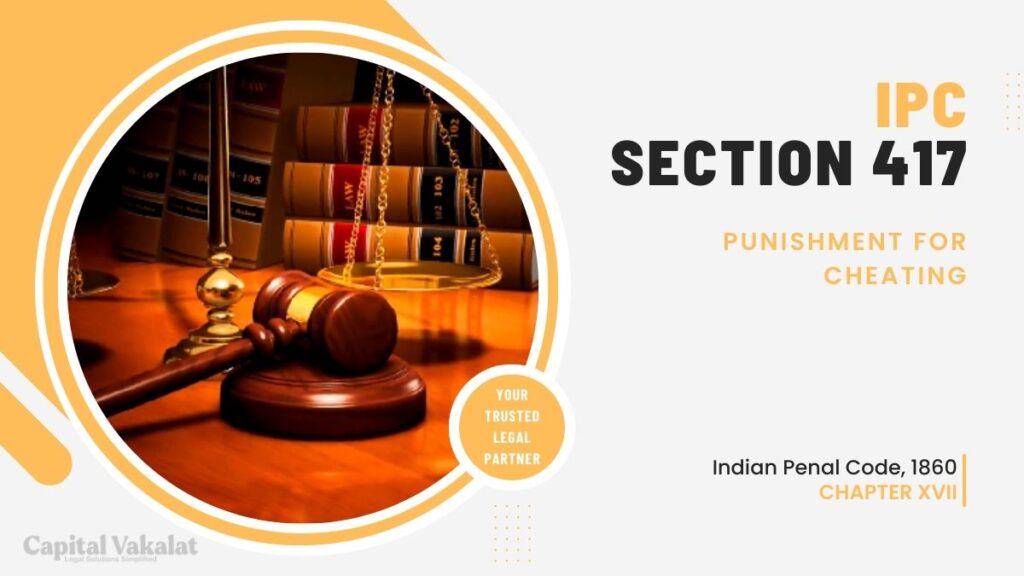Welcome, legal enthusiasts and curious minds alike, as we embark on a riveting journey through the corridors of justice, unraveling the enigma of Section 417 IPC: Punishment for Cheating. In this article, we’re not donning black robes or brandishing gavels, but we are about to demystify the legal lingo surrounding cheating offenses.

So, buckle up – it’s time to delve into the nitty-gritty details of Section 417 IPC and explore how this legal provision aims to curb deceit and dishonesty in our society.
Decoding Section 417 IPC: What’s It All About?
Understanding the Nuts and Bolts:
Section 417 IPC stands as a sentinel against the breach of trust and the act of deceiving someone. But, what exactly does this section entail? Let’s break it down:
- Definition of Cheating:
- Cheating, as per the section, involves the fraudulent or dishonest inducement of a person to deliver any property or alter their position.
- Essential Elements:
- The offense under Section 417 IPC requires three key elements:
- Dishonest intention
- Inducement
- Causing a person to deliver property or alter position
- The offense under Section 417 IPC requires three key elements:
The Punishment Game: What’s at Stake?
Navigating through the legal labyrinth, it’s crucial to grasp the repercussions that unfold if one is found guilty under Section 417 IPC.
- Imprisonment:
- The section prescribes a term of imprisonment, extending up to one year. Yes, you heard it right – a year behind bars for playing fast and loose with someone’s trust.
- Fine Factor:
- Brace yourselves for the financial hit! Offenders may also be liable to pay a fine as the court deems fit.
Real-life Case Studies: From Boardrooms to Bedrooms
Let’s shift gears and explore how Section 417 IPC has manifested itself in real-life scenarios.
- The Corporate Conundrum:
- In a high-profile corporate fraud case, the CEO of a renowned company was found guilty under Section 417 IPC for manipulating financial statements to entice investors. The court’s verdict sent shockwaves through the business world, emphasizing that no one is above the law.
- The Love Tangle:
- Moving to matters of the heart, a spurned lover used false promises to extract money from their ex-partner. Section 417 IPC came to the rescue, ensuring that deceit in relationships doesn’t go unchecked.
How to Steer Clear of Section 417 IPC: A Quick Guide
Avoiding legal trouble is simpler than you might think. Here’s a quick guide to keep you on the right side of Section 417 IPC:
- Transparent Communication:
- Be crystal clear in your dealings, whether personal or professional. Honest communication is the best defense against any allegations of cheating.
- Document Everything:
- In business transactions or even personal agreements, document everything. A paper trail can serve as a shield against accusations of dishonesty.
- Seek Legal Counsel:
- If in doubt, consult a legal expert. Navigating the legal landscape can be tricky, and professional advice can be invaluable in steering clear of legal pitfalls.
Conclusion: Navigating the Legal Landscape
As we wrap up our expedition through the intricacies of Section 417 IPC: Punishment for Cheating, one thing is crystal clear – the law is no stranger to the complexities of human interactions. From the boardroom to the bedroom, Section 417 IPC stands guard, reminding us all that trust is not to be trifled with.
So, the next time you find yourself tempted to cut corners or manipulate situations, remember the legal sentinel that is Section 417 IPC. It’s a beacon of justice, ensuring that the scales are tipped in favor of honesty and integrity.
Section 417 of the Indian Penal Code (IPC) outlines the punishment for cheating, stating that individuals found guilty could face imprisonment for up to one year, a fine, or both[1][2][4]. Cheating, as defined in Section 415 of the IPC, encompasses various aspects, and additional provisions from sections 416 to 420 delve into specific aspects of cheating[3].
Frequently Asked Questions
How is “Dishonest Intention” Determined?
Ah, the crux of the matter! The court typically scrutinizes the circumstances surrounding the alleged cheating. If it’s apparent that the accused had a dishonest intention to induce someone, the legal hammer may come down hard.
Can a Verbal Promise Constitute Cheating?
Yes, indeed! Cheating is not confined to grand schemes or elaborate plots. Even a seemingly innocuous verbal promise, if made with dishonest intent, can land someone in the crosshairs of Section 417 IPC.
What’s the Role of Consent in Cheating Cases?
Consent is like the North Star in legal matters. If obtained through deception, it loses its sanctity. Section 417 IPC takes a dim view of induced consent, considering it a key element in the offense.
Can Section 417 IPC Be Invoked in Business Transactions?
Absolutely! This section is a versatile tool in the legal arsenal. Whether it’s personal relationships or business dealings, cheating in any form can be dealt with under Section 417 IPC.